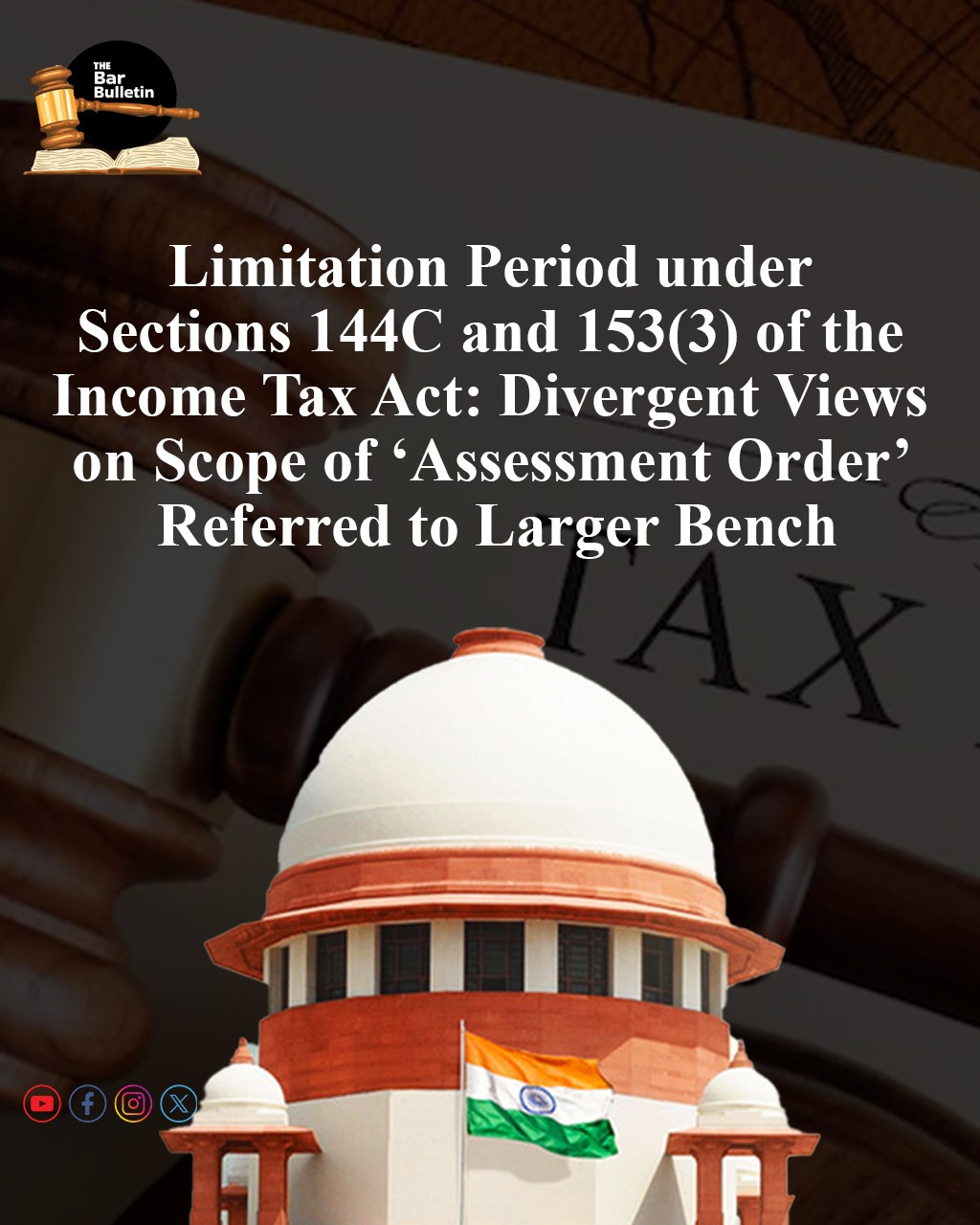In a split verdict, the Supreme Court has discussed the applicability of Section 153 of the Income Tax Act and all its sub-sections in cases of assessment proceedings under Section 144C, and the timelines prescribed therein, which would apply to the draft assessment order to be passed under Section 144C(1). On one hand, the Lordship held that if proceedings u/s 92C are invoked, the time u/s 153(4) would be extended by a period of 12 months. At the same time, another Lordship took the view that the fixed time prescribed u/s 144C must be adhered to, and a final assessment order must be passed either within one month of the draft assessment order, or within 11 months from the passing of the draft assessment order if the taxpayer opts to file objections before the Dispute Resolution Panel (DRP).
Since the Division Bench comprising Justice B.V. Nagarathna and Justice Satish Chandra Sharma has a dissenting opinion on the question of applicability of Section 153 to a proceeding u/s 144C, namely as to whether the period of eleven months should be over and above the limitation prescribed, they referred the dispute relating to the interpretation and interplay between Section 144C and Section 153(3), more specifically, as to what are the periods of limitations prescribed for the revenue authorities to take action against a taxpayer and how the limitation periods and procedures prescribed in these two Sections co-exist, to a larger Bench.
Speaking for the Bench, Justice Nagarathna referred to the proviso to sub-section (3) of Section 153, to state that the period of twelve months has to be calculated from the end of the financial year in which the order is received by the Principal Chief Commissioner or Chief Commissioner etc., as the case may be. Therefore, what is of significance is the date of the commencement of the limitation period of twelve months, which commences from the end of the financial year in which the order passed u/s 254 by the Tribunal, setting aside or cancelling an assessment is received by the Principal Chief Commissioner or Chief Commissioner etc.
Justice Nagarathna went on to state that in a case where Section 144C applies, i.e., where a reference to the DRP applies, then in such a case the time frame has been given for the conclusion of the proceedings initiated under said provision, which is only eleven months from the date of passing the draft order, and the procedure contemplated u/s 144C applies to only two categories of assesses, who are called as eligible assessees u/s 144C(15)(c). The first category of eligible assessee is any person in whose case the variation referred to u/s 144C(1) arises as a consequence of the order of the Transfer Pricing Officer passed u/s 92CA(3), and the second category is in the case of any non-resident not being a company or any foreign company.
Whereas, in a conflicting opinion, Justice Sharma opined that once a draft assessment order is issued u/s 144C, the AO is incapacitated to conduct further independent enquiries or raise any fresh issue in the final assessment order that was not part of the draft assessment order. The AO acts in an executory role once the draft assessment order is issued u/s 144C(1). Justice Sharma elaborates that since the AO performs an executory role u/s 144C after the draft assessment order is issued, Explanation 1 to Section 153 has no relevance in the context of Section 144C. Even otherwise, since when Section 144C operates not withstanding Section 153, and since the timelines u/s 144C are over and above the timelines u/s 153, Explanation 1 to Section 153 has no relevance.
In this case, the respondents, a group of companies incorporated overseas, engaged in the business of shallow water drilling for clients engaged in the oil and gas industry, had filed their return declaring a total loss of Rs. 120.18 crores, which was selected for scrutiny and subsequently, a draft assessment was passed computing the respondents’ total income at Rs. 4.34 crores. Neither the DRP nor the ITAT accepted the objections of the respondent and the matter was merely remanded, culminating in a show-cause notice (SCN) to the respondents, who contended that no final assessment order could be passed now as the period of limitation already expired u/s 153(3) read with the provisions of the Taxation and other laws (Relaxation and Amendment of Certain Provisions) Act, 2020 (TOLA). The matter knocked on the door of the High Court, which held that the limitation period u/s 153 is to be considered as binding, even if section 144C is a complete code in itself, and the proceedings on remand to AO cannot be done at leisure, sans imposition of any time limit at all. Challenging such holding, the Revenue Department approached the Apex Court.
Appearances:
ASG N. Venkatraman, Senior Advocate Swarupama Chaturvedi, AOR Raj Bahadur Yadav, and Advocates H.R. Rao, Udai Khanna, V. Chandrashekhara Bharathi, Ashok Panigrahi, Sachin Sharma, and A Deepa, for the Petitioners
Senior Advocate Jehangir D. Mistry, AORs Faisal Sherwani, and Advocates Kunal Cheema, and Advocates Rubal Bansal Maini, Prakhar Pandey, and Satvik Sareen, for the Respondent

